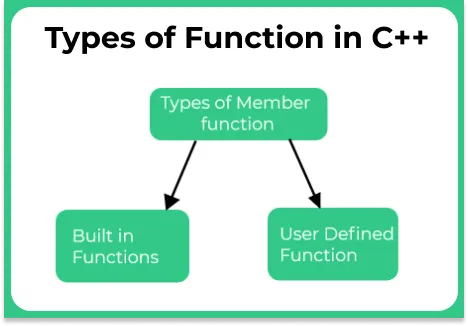Functions in C++
Functions
On this page we will discuss about Functions in C++. Function is a self-defined block which performs a predefined task. A function can be reused any number of times and anywhere in the program.
Functions in C++
Below is the syntax of the Functions in C++ with example
Syntax:
return_type func_name(args)//function definition { --- stmts;//fun_body }
Example:
int add()//func_def { int a=2,b=3;//fun_body return a+b; }

Functions in C++ are defined in 2 ways:
1.Predefined functions
- These functions are been already defined by the designer and placed in the library
- We can make use of these library functions to get the pre-defined output instead of writing our own code to get those outputs.
- ex: pow() in math.h ,printf() in stdio.h
2.User defined functions
- These are defined and customized by the user per the requirement
- ex: add()
Function components
To write the programs on function on any language we should understand the following 8 components
1.Function declaration(prototype)
- Function declaration tells the compiler the return type of the functions, number of arguments, function return type of the arguments and order of arguments
- A function declaration can be inside or outside the main() but the before function call;
return_type func_name(arg1,arg2..argn);ex:
int sum(int,int);The above function takes 2 inputs of type int and returns the output of type int
2.Function definition
- The set of statements which defines the task of the function
- The return type must be mentioned in function definition which is the same given in function prototype
int sum(int x,int y)// function defination
{
return x+y;
}
3.Function call
- The function call is a request to execute the function defined , till then function will not execute
- No return-type should be specified at the function call
- A user can call function any number of time and anywhere
int add(2,3);//invalid add(2,3);//valid
4.Formal Parameters
- The parameters present in the function definition are formal parameters
- Formal parameters will receive value from the actual parameter
- Formal parameters must be variable type only
int sum(int x,int y)//func_defination { return x+y; // x and y are formal parameters }
5.Actual parameters
- Parameters passed during function call are called formal parameters
- Actual parameters make a communication to formal parameters
- They can be the variable, constant or expression type
add(2,3);//constant type actual parametres add(x,y);//variable type actual parametres add(2*3,7-2);//expression type actual parametres
6.Return statement
- Return type specifies the function output and allocates some space to function
- Return type also depends on arguments type
int sum(int,int); float sum(int,float); long fact(int);
- Generally, it is used at the function definition end, because it makes to exit the function module
- Another major purpose of the return statement, it exits from the function module and gives control back to the caller
Run
Output:
#include <iostream> using namespace std; int demo()//fun definition { cout<<"control acquired from main\n"; return 1; //return0;error:multiple return types not allowed } int main() { cout<<"before call control under main\n"; cout<<"controltranmsferreed from main to demo\n"<<demo(); cout<<"control return back from demo to main()\n"; return 0; }
before call control under main controltranmsferreed from main to demo control acquired from main control return back from demo to main()
- here function call at line demo() transfers function call to from main() to demo(), “return 1” transfers control back to main()
- Only one return statement is allowed in a function definition
- void return type function cannot use the return statement
void add()
{
return a+b;//error:void cannot return
}
7.Function call
It is the function in which a function call is mademain()//fun call
{
add(2,3);
}
- here main() is calle for add() function, main is requesting add() to execute
8.Function signature
It is function name excluding return type in the function definitionint add(int x,int y)
{
return a+b;
//add(int x,int y) is function signature
} Functions in C++ can be classified in 4 ways
No arguments passed and no return value
Run
#include <iostream> using namespace std; void prime();//func_protoytype int main() { // No argument is passed to prime() prime();//func_call return 0; } // Return type of function is void because value is not returned. void prime() { int num, i, flag = 0; cout << "Enter a positive integer enter to check: "; cin >> num; for(i = 2; i <= num/2; ++i) { if(num % i == 0) { flag = 1; break; } } if (flag == 1) cout << num << " is not a prime number."; else cout << num << " is a prime number."; }
- In the above program, prime() is called from the main() with no arguments.
- prime() takes the positive number from the user and checks whether a number is a prime number or not.
- Since return type of prime() is void, no value is returned from the function.
No arguments passed but a return value
Run
#include <iostream> using namespace std; int prime();//func_protoytype int main() { int num, i, flag = 0; // No argument is passed to prime() num = prime();//func_call for (i = 2; i <= num/2; ++i) { if (num%i == 0) { flag = 1; break; } } if (flag == 1) cout<<num<<" is not a prime number."; else cout<<num<<" is a prime number."; return 0; } // Return type of function is int int prime()//fun_def { int n; printf("Enter a positive integer to check: "); cin >> n; return n; }
- In the above program, prime() function is called from the main() with no arguments.prime() takes a positive integer from the user. Since return type of the function
- is an int, it returns the inputted number from the user back to the calling main() function.
- Then, whether the number is prime or not is checked in the main() itself and printed onto the screen.
Arguments passed but no return value
Run
#include <iostream> using namespace std; void prime(int n);//fun_dec int main() { int num; cout << "Enter a positive integer to check: "; cin >> num; // Argument num is passed to the function prime() prime(num);//func_call return 0; } / There is no return value to calling function. /*Hence, return type of function is void. */ void prime(int n)//func_def { int i, flag = 0; for (i = 2; i <= n/2; ++i) { if (n%i == 0) { flag = 1; break; } } if (flag == 1) { cout << n << " is not a prime number."; } else { cout << n << " is a prime number."; } }
- In the above program, a positive number is first asked from the user which is stored in the variable num.
- Then, num is passed to the prime() function where, whether the number is prime or not is checked and printed.
- Since the return type of prime() is a void, no value is returned from the function.
Arguments passed and a return value.
Run
#include <iostream> using namespace std; int prime(int n);//func_dec int main() { int num, flag = 0; cout << "Enter positive integer to check: "; cin >> num; // Argument num is passed to check() function flag = prime(num);//func_call if(flag == 1) cout << num << " is not a prime number."; else cout<< num << " is a prime number."; return 0; } /* This function returns integer value. */ int prime(int n)//func_def { int i; for(i = 2; i <= n/2; ++i) { if(n % i == 0) return 1; } return 0; }
- In the above program, a positive integer is asked from the user and stored in the variable num.
- Then, num is passed to the function prime() where, whether the number is prime or not is checked.
- Since the return type of prime() is an int, 1 or 0 is returned to the main() calling function. If the number is a prime number, 1 is returned. If not, 0 is returned.
- Back in the main() function, the returned 1 or 0 is stored in the variable flag, and the corresponding text is printed onto the screen.
Which style of functions should be used?
- All four programs above gives the same output and all are technically correct program.
- There is no hard and fast rule on which method should be chosen.
- The particular method is chosen depending upon the situation and how you want to solve a problem.
Factorial Program using functions(no return type no parameter)
Run
#include <iostream> using namespace std; void fact();//func_declartion main()//func_calle { fact();//function call fact();//func_call } void fact()//func_definition { int n; cout<<"enter n value:"; cin>>n; long f=1; while(n==1) { f=f*n; n--; } cout<<"factorial:"<<f; }o/p
enter n value:5 factorial:120
Advantages of Functions
- Debugging: Debugging becomes easier as error sticks to that particular module(function)
- Sourcecode Reusability: Once a function is called from any other module, without rewriting code again
Is main() user-defined or predefined function?
main()is a user-defined function
- The body of the main() is defined by the user as per the requirement
- The main() body can be customized as per the requirement at any time by the user
- The return type of main can be changed
char main()
{
cout<<"size:"<<sizeof(main());
}
Output:
size is 1
main() satisfies all the criteria of user-defined function.
Infinite Loop in Function
- This is very interesting to know that a function can cause an infinite loop
- This happens when recursive calls occur without any bounds i.e no tets condition that stops the function call
void display();//prototype int main() { display();//call } void display()//function_def { cout<<"This will create infinite loop-3shaank"; display();//call itself }Output:
This will create infinite loop-3shaank...infinite times
- Initially, main() is calling the display() which is executed and again calls itself
- As a result, execution is always within the function and control never returns to main(), which results in an infinite loop
Prime Course Trailer
Related Banners
Get PrepInsta Prime & get Access to all 200+ courses offered by PrepInsta in One Subscription
Get over 200+ course One Subscription
Courses like AI/ML, Cloud Computing, Ethical Hacking, C, C++, Java, Python, DSA (All Languages), Competitive Coding (All Languages), TCS, Infosys, Wipro, Amazon, DBMS, SQL and others






Login/Signup to comment